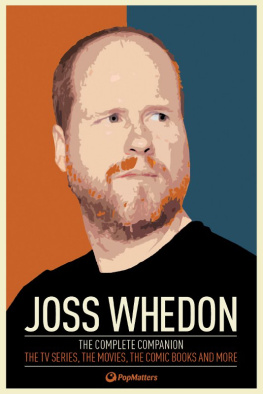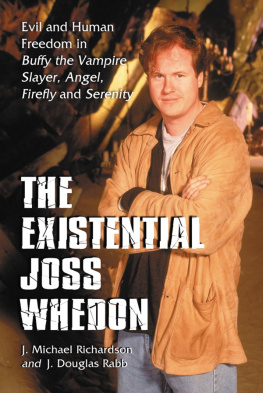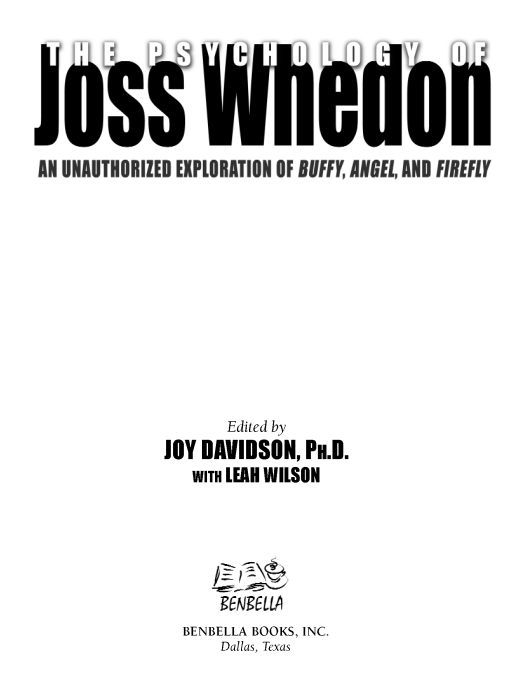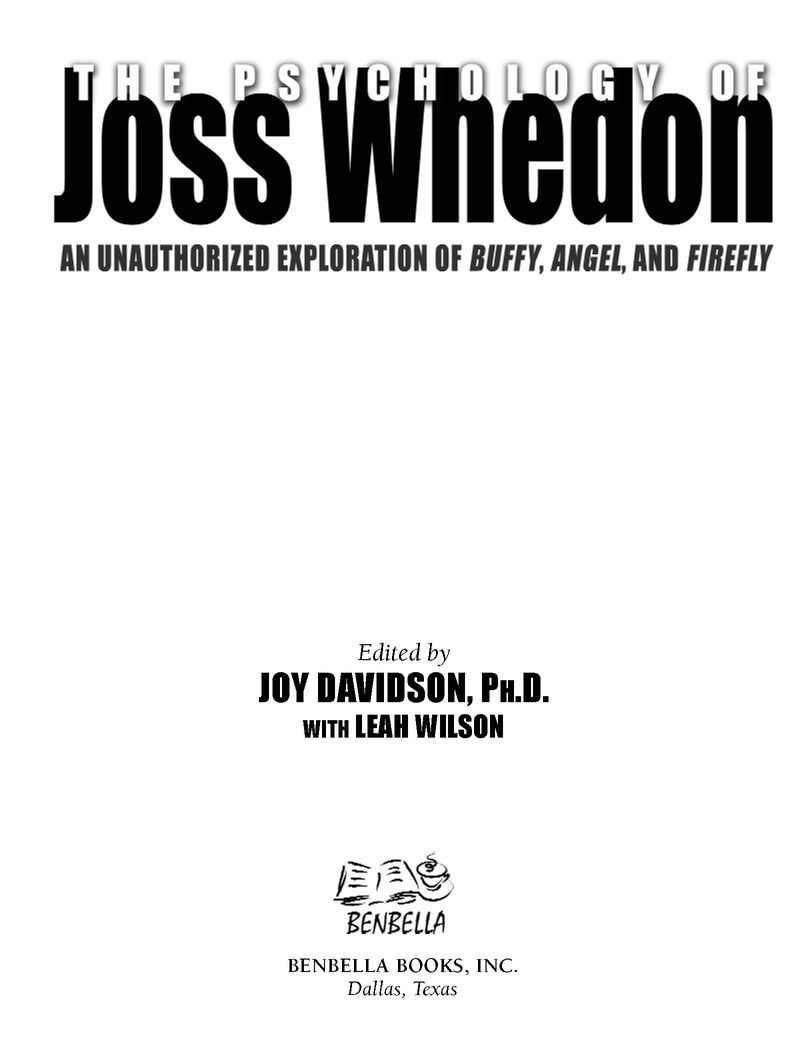Table of Contents
OTHER TITLES IN THE PSYCHOLOGY OF POPULAR CULTURE SERIES
The Psychology of The Simpsons
The Psychology of Harry Potter
The Psychology of Survivor
INTRODUCTION
GILES: But thats the thrill of living on the Hellmouth! Theres a veritable cornucopia of... of fiends and devils and, and ghouls to engage. (everyone looks at him) Pardon me for finding the glass half full.
-The Witch, Buffy the Vampire Slayer (1-3)
CORDELIA: If theres one thing I learned living on a Hellmouth: every day is precious, you never know when it may be your last.
-Double or Nothing, Angel (3-18)
ANGEL: I keep saying that. But nobodys listening.
-Epiphany, Angel (2-16)
Angel is wrong. Nearly everybody is listening-and not just to him. Were listening to all the heroic, fiendish, always complicated characters who populate the universes created by television impresario Joss Whedon. Listening to them is as close as we get to listening to Whedon-and we havent stopped listening since that day in 1997 when the premiere of Buffy the Vampire Slayer kicked off a pop culture domino effect that hasnt yet subsided.
For Love of Joss
Maybe we started listening to Whedon because he was so darn much fun-but we kept listening, and were still listening hard, because he forces us to peer into the remotest corners of our own morally capricious, emotively turbulent world. And we like that. We like the scalpels-edge intensity of the Whedonverse, the way it mirrors and makes sense of our own treacherous plane of existence. We like confronting our darkness, even if, in doing so, we think were still just having fun.
Whedons works are compelling, even addicting. They have bite and soul-a lot like the vampires weve come to adore. When we gaze down into the Whedonverses fathomless abyss, the abyss always gazes back-lending the seductive illusion that were never truly alone. The Whedonverse reveals our human condition in its most glorious and depraved variations, capturing our collective consciousness with unyielding pathos and rollicking humor. That, too, is why we keep listening, keep taking in more of that world, re-experiencing it over and over, through first runs, syndication, films, DVDs, and comic books.
Which brings us to Whedons genius, and the source of our loyalty to him-both of which lie in his capacity to turn a translucent private vision into solid characters riddled with contradictions and emotional paradoxes. Joss gives us heroes who, amidst mesmerizing melodrama and metaphor, kissed by wit, are utterly human-especially when they arent human at all. He gives us characters so fallible, so exquisitely flawed, that we are destined to love them and then immerse ourselves in the verse they inhabit.
Denizens of the Whedonverse, with their full complement of tangled relationships, are sweepingly iconic, too. They represent grand and pervading ideas that extend beyond their isolated selves: from feminism, spirituality, and Marxism, to mortality, passion, and sacrifice. The layered, near-epic quality of Whedons work lends itself to serious study, much like the poetry of T. S. Eliot or the sonnets of Shakespeare. No other contemporary creator of media for the masses has aroused such academic and popular devotion to his original materials-with the possible exception of Gene Roddenberry. Publications that reflect upon the Whedonverse have mushroomed over the past half decade, spanning books aimed at fans as well as academic anthologies, professional journals, Internet journals, fan sites and blogs. University courses and international Buffyology conferences abound, while references to Whedons works spring up in fields as diverse as literature, history, communications, media studies, womens studies, philosophy, religion, linguistics, music, cultural studies, feminist studies, masculinity studies, queer studies, transgender studies, sociology, architecture, and of course, psychology. Whether the discussion centers on the text, the characters, the social context, the audience, or the mythos, all are excavations of what it means to engage in life, to ponder existence, to desire, to love, to nurture, to despise, to risk, to fight... and to die. Thus, its hardly a stretch to suggest that, in one way or another, all studies of the Whedonverse are studies in psychology.
Psychology in the Whedonverse
The breadth of the field of psychology is at least as colorful and variegated as the Whedonverse itself. Each subgenre beneath the umbrella of psychology is a verse of its own, uniquely endowed with history, culture, principles, dogma, traditions and traditionalists, rebels, villains, and heroes. Where strands of psychological sciences or arts intersect, they often do so tentatively, tiptoeing up to one another or accidentally bumping bits before glancing quickly away. Just as the Angelverse and the Buffyverse cross paths but do not breach boundaries, many schools of thought within psychology lean on or borrow from one another while maintaining distinct or somewhat conflicting identities.
The Psychology of Joss Whedon honors the diversity of psychology as an integrated, applied science. Blending theory, research, and clinical approaches, it offers a scientifically kaleidoscopic view of the Whedonverse. Yet readers neednt have a background in advanced science to thoroughly engage with each of the books essays; theyve been written for the Whedon fan, not the academic. Still, they cover an impressively wide swath of intellectual territory. Heres just a sampling of what we take on:
We consider the question of free will in Josss universes: Does it exist? Or might it be a necessary illusion that we mortals clutch just to get through each day?
We highlight evolutionary psychology, a controversially deterministic theory embracing the idea that organisms are shaped by the forces of evolution to find pleasure in that which perpetuates the species. Are
We, therefore, especially drawn to Whedonverse residents who are morally succulent, i.e., who appeal to our evolutionary survival instincts? How does a father-daughter bond (or lack thereof) merge with evolutions sexual selection processes to determine a womans lust/love objects? How might evolutionary theory impact one slayers romantic choices?
We dive into Jungian depth psychology. Freuds disciple, Carl Jung, postulated that in each of our psyches darkest corners there hides an entity containing our forsaken, denied primal urges. His theory suggests that we are most strongly attracted to others who manifest our secret, disowned traits. Does Buffys explosive relationship with Spike reveal her shadow self? Is vampirism actually a metaphor for narcissism?
We segue to traditional models of psychiatry, questioning the degree of pathology in two of the most forensically challenged males aboard Serenity: Mal and Jayne.
We follow a cognitive-behavioral plan for healing adolescent anxiety and depression, and we ask: How can the experience of successfully challenging fear alter a young womans faulty beliefs about herself? How, especially, can this affect an anxious Chosen One, whose every day could be her last?
Were introduced to terror management theory, an innovative field of psychology that seeks to explain how people cope with the daily threat of violent death. In studying terror management, what better living laboratory could we ask for than aboard the ship












